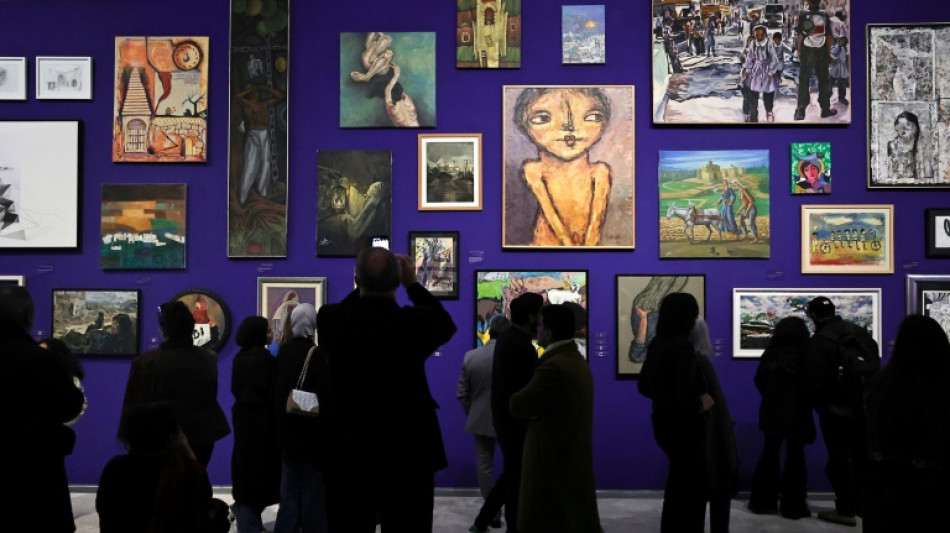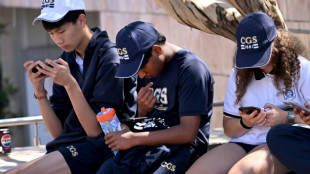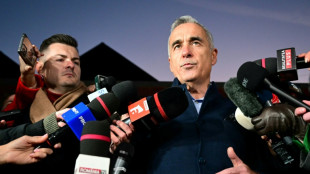

West Bank museum showcases Gaza 'artistic demonstration' against war
At a museum in the Israeli-occupied West Bank, Gazan works on display are proclaimed to be an "ongoing artistic demonstration" in solidarity with the war-ravaged Palestinian territory.
"This is not an exhibition", reads the sign at the entrance to the Palestinian Museum in Birzeit, near Ramallah, showcasing art and heritage from the Gaza Strip.
Alongside contemporary pieces, the works include old, traditional paintings and costumes, as well as archeological artefacts, said board member Ehab Bessaiso, a former culture minister.
He told AFP that the museum had launched the initiative to "preserve Palestinian heritage work in Gaza, which has faced destruction due to the war".
Fighting has raged in Gaza since October 7, when Hamas militants carried out an unprecedented attack on southern Israel.
Gaza's bloodiest war has devastated the small Hamas-ruled coastal territory, with its cultural heritage just one of the many casualties of war.
Bessaiso said the museum had received "the works of hundreds of artists" from Gaza that had been held in West Bank universities and cultural centres and by individuals.
The display presents "the Gazan artistic scene in a new way" which helps "to face the challenges and difficulties which artists and culture are confronting in Gaza amid the destruction and siege", he said.
In a January report, the Palestinian culture ministry said 24 cultural centres in Gaza had been destroyed "in whole or in part" since the start of the war.
They include the Arab Orthodox Cultural and Social Center, the Rashad Shawa Cultural Center -- which includes a theatre, library and printing presses -- and the Al-Sununu for Culture and Arts Association in Gaza City.
Historical buildings such as mosques, churches, the old Phoenician port and the Al-Qarara Cultural Museum have also been destroyed.
- 'Whole lives stolen' -
"It's a beautiful thing to see the work of artists from Gaza here in the West Bank, especially because Gaza no longer has a place to show them after all the destruction there," said Alma Abdulghani, a visitor in her 30s.
The war erupted with Hamas's October 7 attack, which resulted in the deaths of about 1,160 people in Israel, mostly civilians, according to an AFP tally of official figures.
Israel's retaliatory offensive has killed at least 29,782 people, mostly women and children, according to Gaza's health ministry.
Bessaiso said the museum display is "a journey through Gazan Palestinian art, especially following the killing of dozens of artists, writers, poets and journalists".
"This journey affirms the oneness of the Palestinian people, which the (Israeli) occupation is trying to destroy."
The names of 115 artists are on display at the main entrance, with black marks around the names of those killed in the war, among them visual artist Heba Zagout and painter Mohammed Sami Qariqa.
"Those who have had their homes, dreams, memories, loved ones and their whole lives stolen by the genocidal war," read the words inscribed above their names.
The museum administration described the display, which opened in mid-February, as "an alternative space to the one that once existed in Gaza before the war's fires destroyed it".
It said the project aims to be "an alternative platform for the voices" from Gaza, where repeated communications blackouts during the war have prevented them "from reaching us".
- 'Cut off life' -
In the main exhibition hall, a pile of rubble evokes the destruction that has befallen Gaza.
The scene is completed by a constant buzzing noise, a nod to the Israeli surveillance drones that are ever-present in the skies above Gaza, and footage of ambulances transporting a never-ending stream of wounded.
Mohammed al-Huwajia, a visual artist from Rafah in southern Gaza, told AFP by video call that the "exhibition is a reminder of the solidarity between the West Bank and Gaza".
It "affirms that we still exist", he added.
Near the main entrance to the exhibition, traditional dresses and bridal gowns from multiple Gazan cities are on display, as well as braided necklaces and bracelets dating from the British Mandate years.
A painting by Gaza-born artist Tayseer Barakat depicts military machines and vehicles, while another 16 carry written messages about the war.
"This series is a message and an expression of what I saw and heard of what our people in Gaza are living through in this insane war," said Barakat, who was born in Gaza's Jabalia refugee camp and has lived in the West Bank since 1984.
"How do you lose more than 7,000 people? Rain bombs on them one after another, and then prevent them from being removed from the rubble," says the writing on one painting.
"How do we lose a population of two and a half million people? Cut them off from communications, electricity, water and life," says another.
袁-J.Pān--THT-士蔑報




